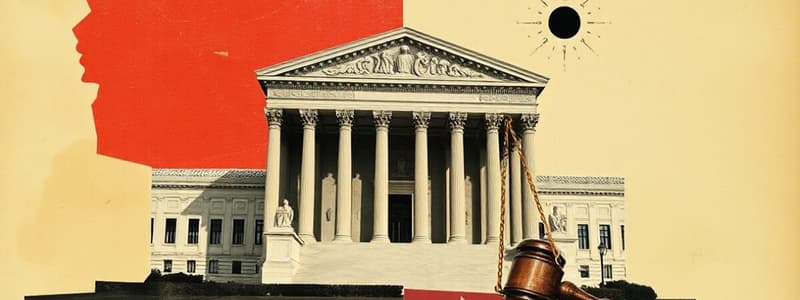Podcast
Questions and Answers
Why did William Marbury sue James Madison in the Supreme Court?
Why did William Marbury sue James Madison in the Supreme Court?
Marbury sued Madison to force him to deliver Marbury's judicial commission. He sought a writ of mandamus.
What crucial constitutional question was presented in Marbury v. Madison?
What crucial constitutional question was presented in Marbury v. Madison?
The case questioned whether the Supreme Court had the authority to review acts of Congress and declare them unconstitutional.
What is the principle of judicial review, and how did Marbury v. Madison establish it?
What is the principle of judicial review, and how did Marbury v. Madison establish it?
Judicial review is the power of the judiciary to invalidate laws that it finds unconstitutional. The Supreme Court established the principle in Marbury v. Madison.
Why did Chief Justice John Marshall declare part of the Judiciary Act of 1789 unconstitutional?
Why did Chief Justice John Marshall declare part of the Judiciary Act of 1789 unconstitutional?
Besides Marbury v. Madison, where else was the idea of judicial review theorized?
Besides Marbury v. Madison, where else was the idea of judicial review theorized?
Flashcards
Marbury v. Madison
Marbury v. Madison
The landmark Supreme Court case that established the principle of judicial review, which gives the judiciary the power to invalidate laws that it finds to be unconstitutional.
Judicial Review
Judicial Review
The power of the judiciary to invalidate laws that it finds to be unconstitutional. This concept was established by the Supreme Court in Marbury v. Madison.
The Constitution
The Constitution
The legal document that specifies the powers of the three branches of the federal government (executive, legislative, and judicial).
Judiciary Act of 1789
Judiciary Act of 1789
Signup and view all the flashcards
Writ of Mandamus
Writ of Mandamus
Signup and view all the flashcards
Study Notes
Marbury v. Madison
- William Marbury was appointed a judge by President John Adams, but didn't receive his commission before Adams left office.
- Thomas Jefferson became president, and his Secretary of State, James Madison, refused to deliver Marbury's commission.
- Marbury sued Madison in the Supreme Court, requesting a writ of mandamus to compel Madison to deliver the commission.
- This case raised the critical constitutional question of whether the Supreme Court could review and overturn acts of Congress.
- The Supreme Court's decision in Marbury v. Madison established judicial review, a power that permits the judiciary to deem laws unconstitutional.
- The case centered on interpreting Article 3 of the Constitution, defining the structure and powers of the judicial branch.
- The Judiciary Act of 1789 granted the Supreme Court original jurisdiction in certain cases, including the issuance of writs of mandamus.
- Chief Justice John Marshall argued the Judiciary Act of 1789 was unconstitutional, exceeding the Supreme Court's original jurisdiction outlined in Article 3.
- Marshall declared the Judiciary Act of 1789 invalid.
- The ruling acknowledged judicial review, a concept previously discussed by Alexander Hamilton in The Federalist Papers, as a pivotal part of the American system of checks and balances.
- This case cemented the Supreme Court's power to determine the constitutionality of laws, significantly influencing the interpretation and application of the Constitution throughout U.S. history.
Studying That Suits You
Use AI to generate personalized quizzes and flashcards to suit your learning preferences.




